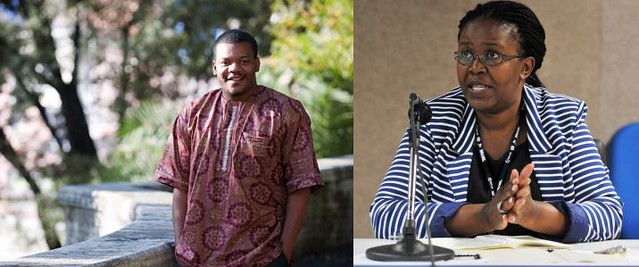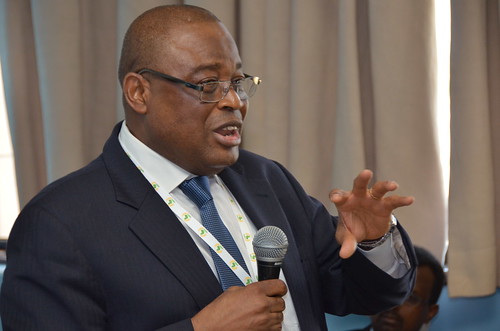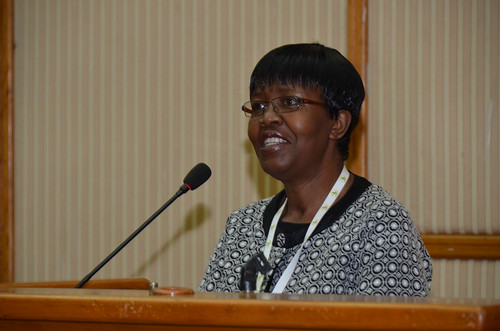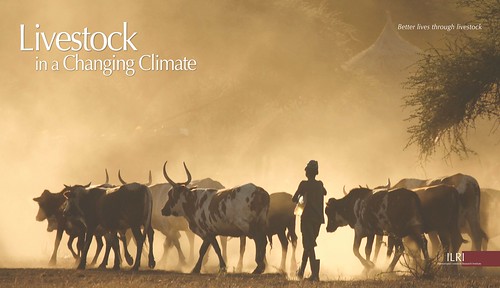Co-winners of the Yara Prize for 2013, announced last night (4 Sep 2013) are Nigerian Nnaemeka Ikegwuonu (left) and Zimbabwean Lindiwe Majele Sibanda, chair of ILRI’s board of trustees (picture credit: Bella Naija).
The Yara Prize 2013 was yesterday awarded to Nnaemeka Ikegwuonu, founder and CEO of the Smallholders Foundation in Nigeria, and Lindiwe Majele Sibanda, CEO of the Food, Agriculture and Natural Resources Policy Analysis Network (FANRPAN) and chair of the board of trustees of the International Livestock Research Institute (ILRI).
The Yara Prize Committee selected two prominent African laureates for their work for African farmers and for the continent’s green revolution. The award recognizes their effective entrepreneurial work which has spread knowledge that has inspired smallholder farmers and youth to improve their lives, and their policy dialogue and advocacy which has enabled change in the African agricultural sector.
Both laureates have, through personal commitment and special efforts, translated ideas on the development of African agriculture into real results. They are both examples of the can-do spirit and drive that is playing a vital role in transforming agriculture in Africa.
The two laureates were celebrated during a Yara Prize Ceremony in Maputo, Mozambique, held yesterday, 4 Sep 2013, in connection with the Africa Green Revolution Forum (AGRF) 2013.
Nnaemeka Ikegwuonu’s award—communicating for impact
Ikegwuonu was being awarded the prize for his entrepreneurial work of using radio as transmitter of sustainable agricultural development and environmental conservation beneficial to rural poor small farmers in the Imo State in southeast Nigeria. Ikegwuonu and the Smallholders Foundation develops and broadcasts 10 hours of educational radio programs daily to 250,000 listeners. The radio programs are held in the local Igbo language. Since 2007, 65 percent of his radio program listeners have increased their agricultural yield by 50 percent and their household income by 45 percent.
Lindiwe Majele Sibanda’s award—advocating for impact
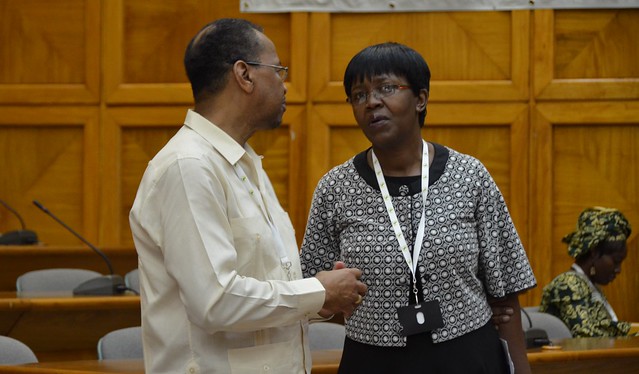
ILRI director general Jimmy Smith and ILRI board chair Lindiwe Majele Sibanda at the 6th Africa Agriculture Science Week (AASW6), in Accra, Ghana, 15-20 Jul 2013, organized by the Forum for Agricultural Research in Africa (FARA) (photo credit: ILRI/Paul Karaimu).
Lindiwe Majele Sibanda was awarded the prize for her many years of work generating knowledge and facilitating dialogue to develop informed, research-based development through policy and advocacy across Africa as CEO of the Food, Agriculture and Natural Resources Policy Analysis Network (FANRPAN), where she has served since 2004.
FANRPAN is perceived to be one of the most influential policy networks across the African region. Its focus areas include policy research and advocacy work on food policy, agricultural productivity, natural resources and environment, and the impact of HIV/AIDS on farmers livelihoods. Sibanda, who is an animal scientist by training as well as a beef farmer herself, has played a global leadership role in increasing the visibility and importance of agriculture as a key development driver. In 2009, Sibanda led the global ‘No-Agriculture, No-Deal’ campaign and mobilized African civil society organizations to push for the inclusion of agriculture in negotiations of the United Nations Framework Convention on Climate Change (UNFCCC).
Sibanda has built the advocacy capacity of FANRPAN through her innovative use of strategic outreach and communication activities, which help leverage and amplify the work done by the organization and its partners at the ground level. In this way, Sibanda has effectively made FANRPAN one of the most recognized and trusted voices on African agriculture and food security, with a strong focus on the continent’s women and young farmers. (Understanding the need to nurture Africa’s youth and include them in agricultural policy processes, FANRPAN launched the FANRPAN Youth in Agriculture Award in 2012.)
Siboniso (‘Boni’) Moyo, another distinguished Zimbabwean animal scientist cum beef farmer, who serves ILRI as its representative for southern Africa, attended the award ceremony in Maputo and was on hand to personally congratulate her country-woman on Sibanda’s achievement. All the directors and staff are delighted to congratulate Lindiwe Majele Sibanda, as well as Nnaemeka Ikegwuonu and both their tireless organizations, for this prestigious award, which is so well deserved and does so much to honour what is right and exciting about Africa and African leadership.
Read a profile of Sibanda.
View a short filmed interview of Sibanda at the July 2013 Accra meeting of the Forum for Agricultural Research in Africa.
View a short animated film, Cultivate the future! How learning together can mean learning better and faster, speeding research into use’, co-developed and narrated by Sibanda.
About the Yara Prize
The Yara Prize for an African Green Revolution seeks to contribute to the transformation of African agriculture and food availability, within a sustainable context, thereby helping to reduce hunger and poverty. The Yara Prize is based on nominations of candidates who are carefully evaluated by the Yara Prize Committee. The Yara Prize consists of USD60,000, which will be split between the laureates, a crystal trophy and a diploma. The Yara Prize was handed out in Oslo from 2005 to 2009. In 2012, it moved to Africa, where it was handed out as part of AGRF 2012 in Arusha, Tanzania. The Yara Prize 2013 was awarded during a ceremony in Maputo, Mozambique, on Wed 4 Sep 2013.

